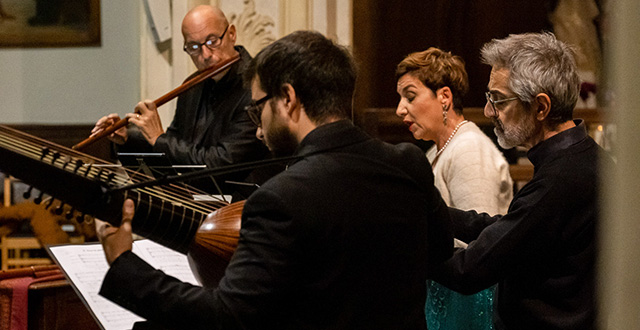Giovanni Pierluigi da Palestrina
500th Anniversary of His Birth
SCHOLA ROMANA ENSEMBLE
Paola Alonzi (Sulamith), soprano
Franco Todde (Solomon), tenor and Renaissance guitar
Lorenzo Sabene, lute
Stefano Sabene, Renaissance transverse flute
The Song of Songs is considered the greatest love poem of all time. In his Fourth Book of Motets, Palestrina chose this biblical text to explore an innovative compositional form—somewhere between sacred motet and secular madrigal—as he himself declared in the original 1587 publication.
Palestrina never abandoned polyphonic language, of which he represents both the pinnacle and the conclusion. Yet among all the works of the Princeps Musicae, the Song of Songs is his most “theatrical” composition. It seems to look ahead—still from a distance—to the early experiments in recitar cantando, which would eventually spark the birth of opera.
This musicological context shapes our interpretation of the work, which deviates from the traditional a cappella vocal arrangement. Only the melodic lines of the two protagonists, Sulamith and Solomon, are sung, while the other voices are entrusted to instruments such as the Renaissance flute, guitar, and lute. This creates a richly textured soundscape that shifts between the expansive phrasing and density of the voices and flute, and the crystalline clarity of plucked instruments.
Our “representational” reading comes through in the vocal roles and variety of musical settings, crafted to render—almost visually—the vivid tapestry drawn by the biblical author. The music unfolds through the “time of singing” (Song 2:12), in the rhythm of the seasons, the alternation of day and night, the blowing winds, and the movement of the stars.
This passage of time is masterfully conveyed by Palestrina’s music, which evokes—more powerfully than many words or commentaries—the colors, sounds, and fragrances of the Middle Eastern world in which the protagonists dwell.
The printed concert program includes the original Latin texts and their modern-language translations, offering a full appreciation of the musical grandeur and the sublime lyricism of the sacred poem.




